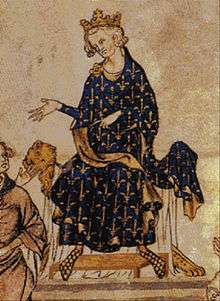Truce of Calais
The Truce of Calais was a truce agreed to by King Edward III of England and King Philip VI of France on 28 September 1347, that was mediated by Pope Clement VI. Originally agreed to last for nine months, it was repeatedly renewed until 1355.
| Type | Time limited truce |
|---|---|
| Context | Hundred Years' War |
| Drafted | September 1347 |
| Signed | 27 September 1347 |
| Location | Calais, France |
| Effective | 27 September 1347 |
| Expiration | 7 July 1348 |
| Expiry | 1355 |
| Mediators | Two cardinals acting as emissaries for Pope Clement VI |
| Original signatories | • Edward III of England • Philip VI of France |
| Parties | • Kingdom of England • Kingdom of France |
| Language | Latin |
Background
On 3 August 1347 the French town of Calais, which had been besieged by an English army for eleven months, capitulated. The commander of the English army, King Edward III (r. 1327–1377), immediately paid off a large part of his army and released his Flemish allies. The French commander, Philip VI of France (r. 1328–1350), in turn stood town the French army. Edward promptly launched strong raids up to 30 miles (48 km) into French territory.[1] Philip attempted to recall his army, setting a date of 1 September, but experienced serious difficulties. His treasury was exhausted and taxes for the war had to be collected in many places at sword point. Despite these exigencies, ready cash was not forthcoming.[2] In addition, the French army had little stomach for further conflict, and Philip was reduced to threatening to confiscate the estates of nobles who refused to muster.[2] He set back the date for his army to assemble by a month.[2] Edward also had difficulties in raising money, partly due to the unexpected timing of the need; he employed draconian measures, which were extremely unpopular.[3] The English also suffered a pair of military setbacks: a large raid was routed by the French garrison of Saint-Omer; and a supply convoy en route to Calais was captured by French raiders from Boulogne.[2]
Truce
Two cardinals acting as papal emissaries from Pope Clement VI had been attempting to negotiate a halt to hostilities since July 1346, with no success. Given the military misfortunes and financial exhaustion of both sides, they found willing listeners in September and by the 28th a truce had been agreed.[4] The treaty strongly favoured the English, and confirmed them in possession of all of their territorial conquests in France and Scotland; the Flemish were confirmed in their de facto independence; and Philip was prevented from punishing those French nobles who had conspired, or even fought, against him.[4] The Truce of Calais was to run for nine months to 7 July 1348. In November 1348 the truce was extended for a further twelve months and again in May 1349. It was subsequently repeatedly extended until it was formally set aside in 1355.[5] The truce did not stop the on-going naval clashes between the two countries nor the fighting in Gascony and Brittany. After full-scale war resumed in 1355 it continued until 1360, when it ended with the Treaty of Brétigny.[6]
Citations
- Sumption 1990, p. 583.
- Sumption 1990, p. 584.
- Ormrod 1990, pp. 21, 189.
- Sumption 1990, p. 585.
- Wagner 2006, pp. 74–75.
- Rogers 1994, p. 102.
References
- Ormrod, W. Mark (1990). Edward III. New Haven: Yale University Press. ISBN 978-0300055061.CS1 maint: ref=harv (link)
- Rogers, Clifford J (1994). "Edward III and the Dialectics of Strategy, 1327-1360". Transactions of the Royal Historical Society, Vol. 4. Transactions of the Royal Historical Society. 4. Cambridge: Cambridge University Press on behalf of the Royal Historical Society. pp. 83–102. doi:10.2307/3679216. JSTOR 3679216. OCLC 931311378.CS1 maint: ref=harv (link)
- Sumption, Jonathan (1990). Trial by Battle. London: Faber and Faber. ISBN 978-0571200955.CS1 maint: ref=harv (link)
- Wagner, John A. (2006). "Calais, Truce of (1347)". Encyclopedia of the Hundred Years War. Woodbridge, Suffolk: Greenwood. ISBN 978-0313327360.CS1 maint: ref=harv (link)
.jpg)
